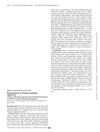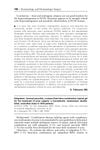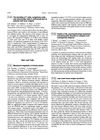 1 citations,
July 2015 in “AACE clinical case reports”
1 citations,
July 2015 in “AACE clinical case reports” Removing both ovaries treated the woman's excess male hormone symptoms.
 1 citations,
November 2011 in “Open access journal of contraception”
1 citations,
November 2011 in “Open access journal of contraception” Birth control pills with low-dose estrogen and antiandrogenic progestins can effectively treat acne.
 1 citations,
January 2008 in “Actas Dermo-Sifiliográficas”
1 citations,
January 2008 in “Actas Dermo-Sifiliográficas” Treat hair loss in postmenopausal women with diet, avoiding certain drugs, and using medications like minoxidil or finasteride.
 1 citations,
November 2002 in “Endocrine practice”
1 citations,
November 2002 in “Endocrine practice” The patient's high testosterone was reduced by a medication that suppresses gonadotropin.
 1 citations,
December 1997 in “Journal of The European Academy of Dermatology and Venereology”
1 citations,
December 1997 in “Journal of The European Academy of Dermatology and Venereology” All women with significant unwanted hair growth have hormonal imbalances, often from polycystic ovary syndrome.

A thorough diagnostic process and teamwork are crucial for managing complex hyperandrogenism in postmenopausal women.
 January 2024 in “Journal of the Endocrine Society”
January 2024 in “Journal of the Endocrine Society” The research found that measuring androgens in urine can give extra information about body metabolism and is linked to androgen levels in the blood, especially in young girls.
 January 2023 in “Scholars journal of applied medical sciences”
January 2023 in “Scholars journal of applied medical sciences” The main causes of hirsutism in Jordanian women are PCOS and idiopathic hirsutism.
 November 2022 in “Journal of the Endocrine Society”
November 2022 in “Journal of the Endocrine Society” A rare ovarian tumor caused high testosterone and excess hair in a woman, which was resolved after tumor removal.
 September 2022 in “Curēus”
September 2022 in “Curēus” The removed ovarian tumor was a rare type of blood vessel tumor that improved the patient's symptoms and hormone levels after surgery.

Isotretinoin may cause temporary, reversible facial hair growth in some women.
 October 2021 in “Turkderm”
October 2021 in “Turkderm” Hormonal imbalances, not insulin resistance or dyslipidemia, may be more important in causing acne in women over 25.
 September 2021 in “International Journal of Biomedicine”
September 2021 in “International Journal of Biomedicine” Certain gene variations are linked to a higher risk of severe acne, suggesting a genetic influence on the condition.
 May 2021 in “Journal of Advances in Internal Medicine”
May 2021 in “Journal of Advances in Internal Medicine” A 13-year-old with 46 XY DSD had ambiguous genitalia due to incomplete masculinization.
 November 2020 in “Elsevier eBooks”
November 2020 in “Elsevier eBooks” Antiandrogens and androgen inhibitors like spironolactone, finasteride, and dutasteride can treat hair loss and skin conditions, but they have risks and side effects, including potential harm to pregnant women and risks of cancer and heart issues. Herbal remedies also have antiandrogenic effects but lack safety validation.
 April 2017 in “Journal of evolution of medical and dental sciences”
April 2017 in “Journal of evolution of medical and dental sciences” Most women with excess hair growth had Polycystic Ovary Syndrome, and severity wasn't linked to hormone levels.
 January 2017 in “Springer eBooks”
January 2017 in “Springer eBooks” The document explains various skin conditions and their treatments.
 January 2016 in “Springer eBooks”
January 2016 in “Springer eBooks” Pubertal acne is linked to hormonal changes, affects quality of life, and is treated similarly to adult acne.
 January 2016 in “Journal of SAFOG”
January 2016 in “Journal of SAFOG” Girls with PCOS and menstrual disorders have notably higher androgen hormone levels.
 December 2015 in “Вестник дерматологии и венерологии”
December 2015 in “Вестник дерматологии и венерологии” Men with male pattern baldness may not have different hormone levels, but their hair follicles are likely more sensitive to hormones.
 July 2015 in “Cambridge University Press eBooks”
July 2015 in “Cambridge University Press eBooks” The document concludes that treatments for female hair loss and excess body hair are available, but managing expectations is important.
 July 2015 in “Cambridge University Press eBooks”
July 2015 in “Cambridge University Press eBooks” Androgens like testosterone affect skin health and can lead to conditions such as acne and hair loss, with various treatments available.
 January 2014 in “European Geriatric Medicine”
January 2014 in “European Geriatric Medicine” A postmenopausal woman's virilization was caused by a rare ovarian tumor that was hard to detect but was successfully treated with surgery.
 October 2011 in “Iranian Journal of Dermatology”
October 2011 in “Iranian Journal of Dermatology” Men with male pattern baldness may have a higher risk of heart disease due to increased levels of a specific lipid in their blood.
 January 2011 in “Yearbook of Dermatology and Dermatologic Surgery”
January 2011 in “Yearbook of Dermatology and Dermatologic Surgery” The adapalene-benzoyl peroxide gel works better and faster for acne treatment than using either ingredient alone, with manageable side effects.
 December 1997 in “Journal of The European Academy of Dermatology and Venereology”
December 1997 in “Journal of The European Academy of Dermatology and Venereology” Most women with excessive hair growth have a hormonal cause.
 September 1997 in “Journal of the European Academy of Dermatology and Venereology”
September 1997 in “Journal of the European Academy of Dermatology and Venereology” Adults can develop late-onset loose anagen syndrome, which may often be misdiagnosed.
 September 1997 in “Journal of the European Academy of Dermatology and Venereology”
September 1997 in “Journal of the European Academy of Dermatology and Venereology” Hirsute women with ovarian-sourced hirsutism are more likely to have irregular periods, with higher BMI and altered hormone ratios.
 September 1997 in “Journal of the European Academy of Dermatology and Venereology”
September 1997 in “Journal of the European Academy of Dermatology and Venereology” People with acne have more CD4+ immune cells in their skin than healthy people.
 January 2008 in “The Year book of endocrinology”
January 2008 in “The Year book of endocrinology” Gene variant linked to prostate cancer, hormone levels, and hair loss.






























